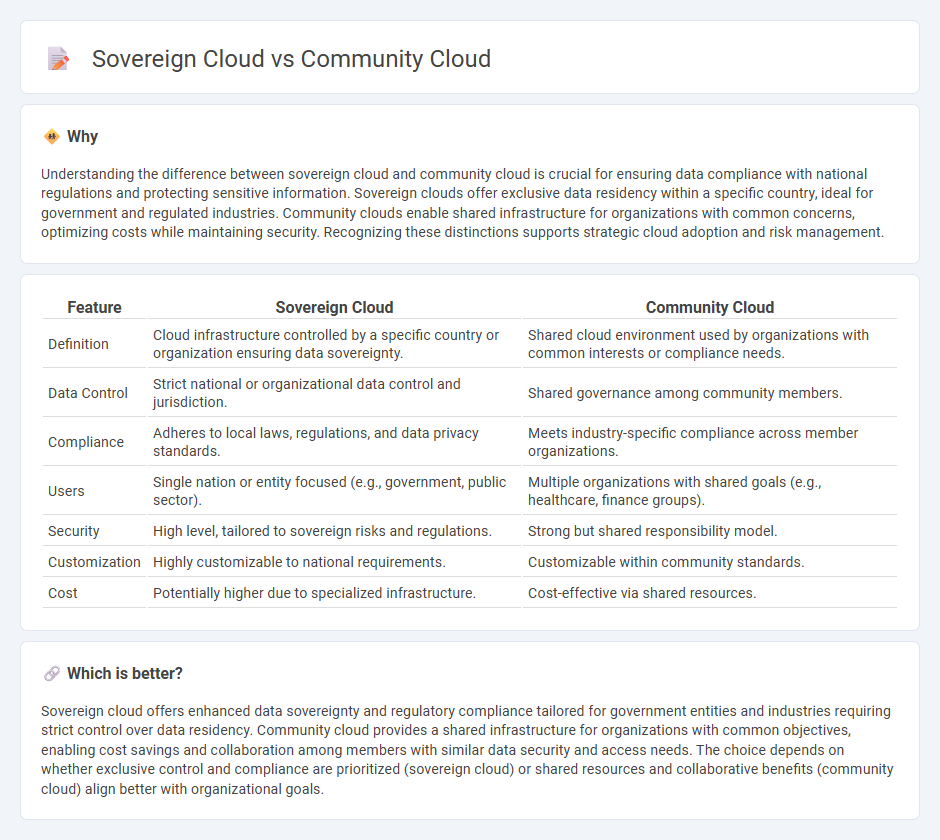
Sovereign cloud offers data control and compliance tailored to specific countries by localizing storage and processing within national borders, enhancing privacy and regulatory adherence. Community cloud shares resources among organizations with common interests or compliance requirements, optimizing collaboration while maintaining security through shared governance. Explore the differences and benefits of sovereign and community cloud solutions to determine the best fit for your organization's needs.
Why it is important
Understanding the difference between sovereign cloud and community cloud is crucial for ensuring data compliance with national regulations and protecting sensitive information. Sovereign clouds offer exclusive data residency within a specific country, ideal for government and regulated industries. Community clouds enable shared infrastructure for organizations with common concerns, optimizing costs while maintaining security. Recognizing these distinctions supports strategic cloud adoption and risk management.
Comparison Table
| Feature | Sovereign Cloud | Community Cloud |
|---|---|---|
| Definition | Cloud infrastructure controlled by a specific country or organization ensuring data sovereignty. | Shared cloud environment used by organizations with common interests or compliance needs. |
| Data Control | Strict national or organizational data control and jurisdiction. | Shared governance among community members. |
| Compliance | Adheres to local laws, regulations, and data privacy standards. | Meets industry-specific compliance across member organizations. |
| Users | Single nation or entity focused (e.g., government, public sector). | Multiple organizations with shared goals (e.g., healthcare, finance groups). |
| Security | High level, tailored to sovereign risks and regulations. | Strong but shared responsibility model. |
| Customization | Highly customizable to national requirements. | Customizable within community standards. |
| Cost | Potentially higher due to specialized infrastructure. | Cost-effective via shared resources. |
Which is better?
Sovereign cloud offers enhanced data sovereignty and regulatory compliance tailored for government entities and industries requiring strict control over data residency. Community cloud provides a shared infrastructure for organizations with common objectives, enabling cost savings and collaboration among members with similar data security and access needs. The choice depends on whether exclusive control and compliance are prioritized (sovereign cloud) or shared resources and collaborative benefits (community cloud) align better with organizational goals.
Connection
Sovereign cloud and community cloud share a focus on data sovereignty, compliance, and collaborative governance, enabling organizations to maintain control over data within specific legal jurisdictions. Both cloud models facilitate secure, shared infrastructure tailored to meet regulatory requirements, enhancing trust among users in sectors such as government, healthcare, and finance. By prioritizing data privacy and compliance, sovereign and community clouds support robust, jurisdiction-aware cloud strategies for sensitive workloads.
Key Terms
Shared infrastructure
Community cloud leverages shared infrastructure among organizations with common compliance requirements, enabling cost efficiency and collaborative resource management. Sovereign cloud emphasizes data sovereignty by ensuring infrastructure is controlled within strict national or organizational boundaries, prioritizing security and regulatory adherence. Explore in-depth comparisons of infrastructure models to choose the right cloud deployment for your compliance needs.
Data sovereignty
Data sovereignty in community cloud environments ensures that data is stored and processed within a specific geographic or organizational boundary shared by a group with common compliance requirements. Sovereign cloud takes data sovereignty further by guaranteeing full control, residency, and compliance strictly under national laws, often enforced by government regulations. Explore how these cloud models address data sovereignty challenges to choose the best solution for your organization's regulatory needs.
Compliance
Community cloud ensures compliance by sharing infrastructure among organizations with common regulatory requirements, streamlining governance and data security frameworks tailored to specific industries. Sovereign cloud emphasizes strict national data sovereignty laws, guaranteeing data residency, control, and compliance with country-specific regulations like GDPR or HIPAA. Explore detailed compliance strategies and benefits to determine the best fit for your organization's needs.
Source and External Links
What is Community Cloud? Advantages & Examples - phoenixNAP - A community cloud is a cloud deployment model where infrastructure is shared exclusively by organizations with common concerns such as security and compliance, combining private cloud control with public cloud collaboration benefits.
Community Cloud - GeeksforGeeks - Community clouds enable multiple organizations with similar goals or regulatory needs to share resources and collaborate securely, often serving sectors like healthcare, government, and education with cost-effective solutions.
Community cloud - Wikipedia - Community cloud is a collaborative cloud infrastructure shared by organizations with common concerns and can be managed internally or by third parties, providing a middle ground between public and private clouds.
 dowidth.com
dowidth.com